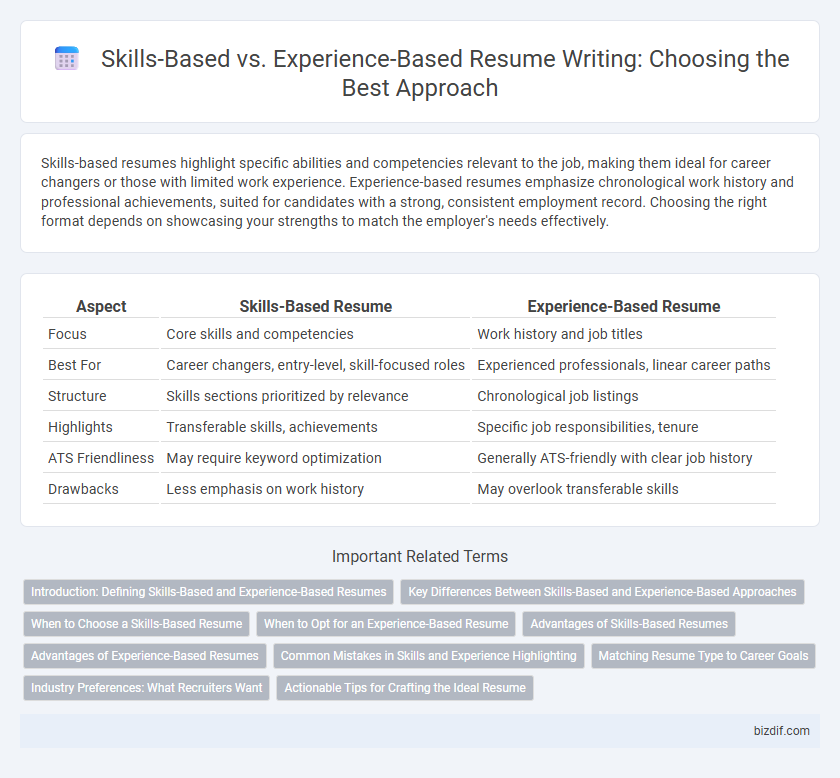Skills-based resumes highlight specific abilities and competencies relevant to the job, making them ideal for career changers or those with limited work experience. Experience-based resumes emphasize chronological work history and professional achievements, suited for candidates with a strong, consistent employment record. Choosing the right format depends on showcasing your strengths to match the employer's needs effectively.
Table of Comparison
| Aspect | Skills-Based Resume | Experience-Based Resume |
|---|---|---|
| Focus | Core skills and competencies | Work history and job titles |
| Best For | Career changers, entry-level, skill-focused roles | Experienced professionals, linear career paths |
| Structure | Skills sections prioritized by relevance | Chronological job listings |
| Highlights | Transferable skills, achievements | Specific job responsibilities, tenure |
| ATS Friendliness | May require keyword optimization | Generally ATS-friendly with clear job history |
| Drawbacks | Less emphasis on work history | May overlook transferable skills |
Introduction: Defining Skills-Based and Experience-Based Resumes
Skills-based resumes emphasize core competencies and abilities, highlighting transferable skills relevant to the job, while experience-based resumes focus on chronological work history and specific job roles. Skills-based formats are ideal for career changers or those with employment gaps, showcasing qualifications over job titles. Experience-based resumes are preferred when a consistent work history aligns closely with the desired position.
Key Differences Between Skills-Based and Experience-Based Approaches
Skills-based resumes highlight specific competencies such as project management, technical proficiency, and communication skills, making them ideal for career changers or those with limited experience in the target field. Experience-based resumes emphasize job titles, employers, and timelines, showcasing a candidate's professional history and career progression. The key difference lies in the focus: skills-based centers on abilities relevant to the job, while experience-based prioritizes past roles and achievements.
When to Choose a Skills-Based Resume
A skills-based resume is ideal for job seekers with limited work experience, career changers, or those re-entering the workforce who want to highlight transferable skills over job history. Emphasizing core competencies like communication, problem-solving, and technical abilities allows candidates to showcase their qualifications relevant to the specific role. This format is especially effective when chronological experience does not directly align with the targeted position or when gaps in employment exist.
When to Opt for an Experience-Based Resume
Choose an experience-based resume when you have a strong, relevant work history that aligns closely with the job requirements. Highlighting specific roles, accomplishments, and career progression demonstrates your practical expertise and reliability to employers. This format is particularly effective in industries valuing proven hands-on experience over theoretical knowledge or skills alone.
Advantages of Skills-Based Resumes
Skills-based resumes highlight relevant abilities and competencies, making it easier for employers to identify qualifications tailored to specific job requirements. This format benefits career changers and recent graduates by emphasizing transferable skills over chronological work history. Employers can quickly assess candidates' potential through clearly categorized skills, improving the chances of passing automated applicant tracking systems.
Advantages of Experience-Based Resumes
Experience-based resumes highlight practical job history and measurable accomplishments, making it easier for employers to assess a candidate's proven track record. This format emphasizes specific roles, responsibilities, and quantifiable results, demonstrating consistent career progression and reliability. Employers often favor experience-based resumes because they provide clear evidence of industry expertise and real-world problem-solving abilities.
Common Mistakes in Skills and Experience Highlighting
Common mistakes in resume writing include overloading the skills section with generic buzzwords that lack relevance to the job description, reducing the impact of an applicant's qualifications. Focusing solely on experience-based accomplishments without quantifying results or demonstrating transferable skills can undermine a candidate's adaptability to new roles. Effective resumes balance specific, measurable skills with detailed experience highlights to optimize keyword matching and Applicant Tracking System (ATS) compatibility.
Matching Resume Type to Career Goals
Selecting a skills-based resume highlights core competencies and technical abilities, making it ideal for career changers or those with gaps in experience. Experience-based resumes emphasize chronological work history, appealing to candidates with consistent job progression related to their career goals. Tailoring the resume type to align with targeted roles enhances recruiter relevance and improves application success rates.
Industry Preferences: What Recruiters Want
Skills-based resumes highlight specific competencies such as project management, data analysis, or coding languages, aligning with industries like technology and healthcare that prioritize practical abilities. Experience-based resumes emphasize job titles, companies, and accomplishments, preferred in fields such as finance and law where career progression and professional history matter. Recruiters increasingly favor a hybrid approach tailored to industry standards, combining quantifiable skills with relevant achievements to maximize candidate impact.
Actionable Tips for Crafting the Ideal Resume
Highlight specific skills by using targeted keywords to pass Applicant Tracking Systems and demonstrate your proficiency in relevant areas. Quantify achievements and incorporate measurable results to showcase tangible impact and experience. Tailor the resume to the job description by balancing hard skills like software proficiency with soft skills such as communication, ensuring clarity and relevance for hiring managers.
Skills-based vs Experience-based Infographic

 bizdif.com
bizdif.com